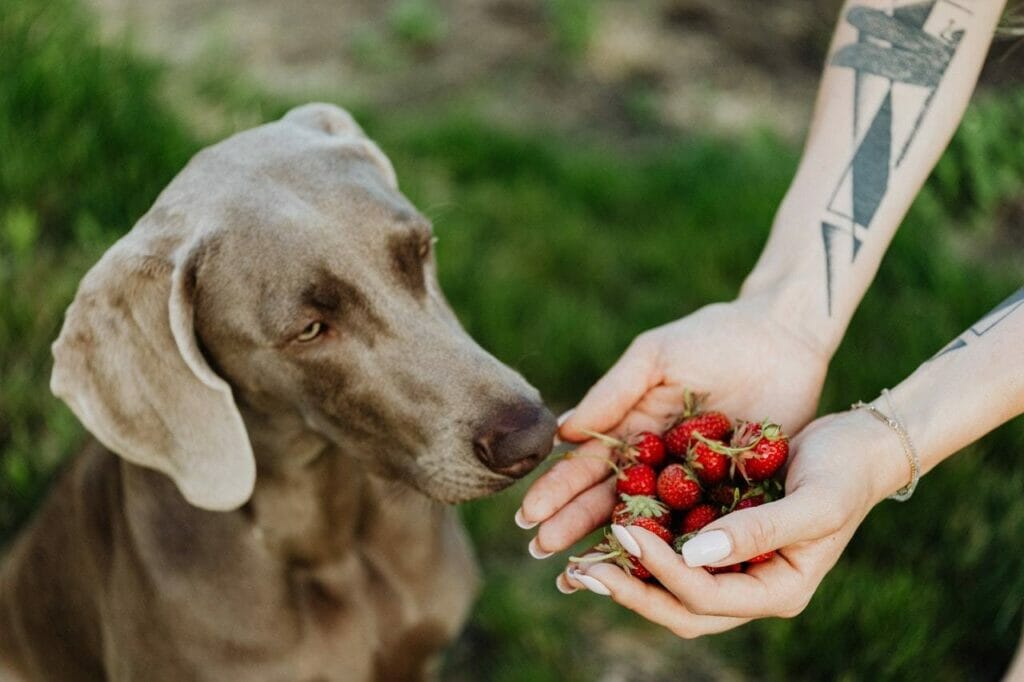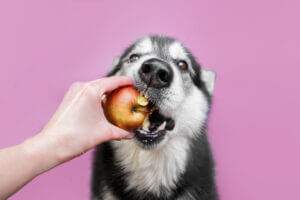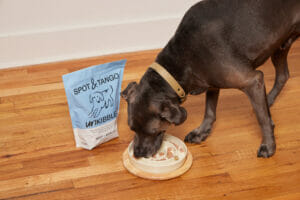Strawberries are a delicious, nutritious snack for humans, and they’re even better as part of a sweet dessert. Strawberries are widely available, especially in the warmer months when they’re in abundance. With humans enjoying strawberries, the question begs to be answered; can dogs eat strawberries too?
Given that some fruits and veggies like grapes and onions aren’t good choices for your furry companion, you’d be right to wonder if you can give dogs strawberries and if strawberries are safe for dogs.
Dogs have different digestive systems and needs compared to humans, so it’s always a good idea to be sure and play it safe before giving human food to your pet. We already talked about apples and mangoes for dogs, but what about strawberries?
Read on for a closer look at the implications of strawberries for dogs, learn whether you can feed strawberries to your dog, and read how to safely add them to your dog’s diet.
You’ll also discover a safe treat option from Spot and Tango that makes an excellent alternative to strawberries for your dog if they’re allergic or get an upset stomach.
Dogs And Strawberries – Can Dogs Eat Strawberries?
The simple answer is, yes, dogs can eat strawberries! They are a nutritious and healthy snack for your dog, just as they are for humans. If you’re incorporating strawberries into your own diet, it’s okay to hand a few over for your dog to nibble on.
Unlike other summer fruits like cherries and grapes, strawberries are safe for your pet, provided you properly clean them, remove the leaves, and serve them in bite-sized pieces to prevent an intestinal blockage or choking.
As with any other snack, you should give strawberries to your dog in moderation, so keep the portions small. You could occasionally substitute your dog’s usual treats with strawberries to keep things interesting for your pup, providing them with a nutrition boost and a great flavor snack alternative at the same time. Most dogs love the taste of strawberries, together with their soft texture.
Keep in mind that your dog still needs a balanced diet, so you can’t give them strawberries alone. Treats like strawberries shouldn’t make up more than 10% of your dog’s calorie intake for the day.
Start with small quantities and watch out for any allergic reactions, changes in behavior, or digestive issues like stomach upsets.

Are Strawberries Good for Dogs?
Strawberries are a healthy, low-calorie, sweet treat for your dog with several benefits. Not only can dogs eat strawberries safely, but they’re full of antioxidants, minerals, vitamins C, B1, B6, and K, potassium, magnesium, omega-3 fatty acids, folic acid, and iodine – plus they’re high in fiber.
So, is strawberry good for dogs? Absolutely! Many dogs aged over ten will die of cancer, so you need to do all you can to prevent this for your dog. The occasional strawberry can help you in this endeavor.
So, here’s how strawberries can help your dog.
Cancer Prevention
Strawberries are a powerful antioxidant source, and studies show they can help protect your dog from oxidative damage.
Free radicals (brought on by stress, illness, environmental toxins, and age) can cause oxidative damage and play a key role in the development of several diseases like cancer, heart disease, and Alzheimer’s disease.
Reducing the Risk of Heart Disease
While uncommon, dogs can suffer from heart issues like stroke, congestive heart failure, and heart murmurs, especially if they’re overweight. Strawberries are low in protein and fats, making them safe for dogs with special dietary requirements, heart issues, or kidney failure.
As with most fruits and vegetables, strawberries contain minerals and vitamins that promote weight maintenance, boost the immune system, and slow down the aging process. Not only can dogs eat strawberries, but they can benefit from the reduced risk of heart disease.
Managing Immune and Bone Health
Vitamin C will help your dog develop and maintain strong muscles and bones while. Vitamin K is instrumental in blood clotting, regulating calcium levels in blood, and bone metabolism.
The vitamins in strawberries will also help support your dog’s immune health by lowering inflammation in the gut. Almost the entirety of a dog’s immune system is in its gut. A healthy gut is therefore essential for your dog’s overall health.
Strawberries also have high fiber and water content that promotes healthy digestion, assists with weight control, and helps prevent diarrhea and constipation.
Ensuring Sufficient Omega-3 Levels
Omega-3 fatty acids are essential for your dog’s coat health. Sufficient omega-3 levels ensure your dog has a lush, gorgeous, shiny coat.
Additionally, research shows that omega-3 fatty acids can help solve aggressive canine behavior – one of the most common problems reported by dog owners.
Strawberries can help ensure your dog is getting enough omega-3, and if you have an elderly dog, they can help ease and reduce symptoms of arthritis. Magnesium is essential for cell energy, while folic acid and vitamin B6 help in red blood cell production and DNA synthesis.
Promoting Your Dog’s Oral Health
A healthy mouth is vital for the overall wellness of your dog. Malic acid is another bonus enzyme in strawberries, and this can help make your dog’s teeth whiter than ever! These enzymes are essentially bioactive molecules that treat and prevent oral diseases.
If your dog doesn’t chew bones or eat raw food that help clean their teeth, strawberries can be a suitable alternative. They’ll help prevent bacteria from sticking to their gums and teeth, and prevent them from developing gum disease.
Instead of giving your dog off-the-shelf treats full of additives, preservatives, and unhealthy fats, strawberries work well as an occasional fresh substitute.
Safe Treat Option for Your Dog
If your dog is allergic to strawberries or you find they affect their digestive system, recipes with cranberries instead may provide a better, safe treat option for your dog. Spot and Tango advocates for healthy pups by ensuring dogs eat cranberries as part of their diet.
Like strawberries, cranberries are not just good for your dog… they’re super good!
Cranberries contain vitamin C, K1, E, and manganese, and are full of antioxidants, fiber, quercetin, and proanthocyanidin. These support your dog’s immune system, gut, brain, and urinary health while preventing cancer, allergies, joint pain, and heart disease. You can read more about the benefits of cranberries for dogs and how to feed them to your pup here.
One of the best fresh recipes with cranberries is Spot and Tango’s Beef and Millet. It has an incredible aroma and flavor, guaranteed to appeal to your dog. All meals are cooked to order, packaged, frozen to preserve freshness, and delivered to your doorstep within days of being made.
If your dog isn’t a fan of wet food or prefers the convenience of dry food, Spot and Tango’s Unkibble brings you the benefits of cranberries in a dry format. This vet-developed innovation at Spot and Tango combines fresh meat, veggies, and cranberries in a unique Fresh Dry process to maximize nutritional integrity.
The food smells and tastes as good as it looks. The Fresh Dry process ensures every Unkibble bite bursts with nutrition and flavor without the need for preservatives.
How To Feed Strawberries To your Dog
Although strawberries aren’t toxic to dogs, you shouldn’t let them eat as much as they want. When prepared correctly and given in moderation, strawberries are a healthy, tasty treat for your dog.
So what’s the best way to give your dog strawberries? Firstly, you should only feed your dog fresh strawberries. Ensure you wash and clean them thoroughly as you would for your family to rinse away dirt and any residual chemicals.

Select organic strawberries to eliminate concerns related to trace elements of harmful chemicals like pesticides.
Secondly, cut the fruit up into smaller pieces to make it easier for your dog to digest. This will prevent choking. Smaller breeds may enjoy mashed strawberries or a puree added to their food.
Almost all dogs will love cut, frozen strawberries as a refreshing treat to cool them down on a hot summer’s day. Strawberries make an inexpensive, quick treat you can carry on a day outing.
Whichever way you choose to serve them, start slowly. Try feeding your pup small quantities to begin with to see how they react and check if the strawberries cause any problems. You can add more to their diet if they like them.
Call your veterinarian immediately if your dog experiences any digestive issues, a stomach upset, increase in thirst, or intense scratching. Your dog may be having an allergic reaction to the strawberries.
Frequently Asked Questions
Are Strawberries Bad for Dogs?
The occasional fresh or frozen strawberry can’t harm your dog. However, strawberries can be harmful in the following cases:
When Your Dog Eats Too Many Strawberries
Like many fruits, strawberries have high sugar content. Excessive sugar isn’t beneficial for your dog, so you shouldn’t let them eat too many strawberries at once. They might get sick from the excess sugar, and it’s best to stick to a few strawberries at a time.
Canned Strawberries
You may be wondering, can my dog eat strawberries that are canned when fresh ones are out of season? The answer is no. Canned strawberries and any other canned, sugared, or syrup-packed fruits are harmful to your dog. They contain too much sugar and can have added sweeteners like xylitol or preservatives that are toxic to dogs.
The excess sugar and calories defeat the purpose of wanting to give your dog a healthy treat. High sugar food can impact your dog’s behavior and make them little hyper. The extra sugar and calories will also gradually increase the risk of weight gain and weight-related issues like obesity and diabetes.
Some canned fruits are branded as having naturally occurring xylitol, but this can still damage your dog’s teeth and cause stomach upsets. Xylitol is dangerous and even deadly for dogs.
Choking Hazard
Strawberries can present a choking hazard if your dog is a fast eater or likes to swallow things whole, especially if they’re a small breed. To avoid choking, always ensure you cut the strawberries into smaller pieces or mash them. Frozen strawberries can be a choking hazard if your dog swallows a handful at once. Ensure you only freeze small strawberry pieces and give them one at a time.
Allergic Reactions
Although it’s rare, your dog can be allergic to strawberries. That’s why it’s essential to start with small quantities at first and monitor your dog for any reactions. Contact your vet immediately if you notice any adverse reactions after giving your dog strawberries.
You can also consult your vet before giving strawberries to your dog. As a responsible dog owner, you need to be sure of the foods and fruits your dog can and cannot eat.
Can Puppies Eat Strawberries?
Yes! It’s not just puppies that can have strawberries – they’re suitable for dogs at all stages of life. You just need to ensure your puppy isn’t allergic and only feed them the appropriate amount according to their size and activity level, to avoid excess sugar consumption.
Medium-sized and larger dog breeds can have a few strawberries in one sitting, but for small dogs, it’s recommended that you start with one strawberry per sitting. Don’t forget to cut the strawberry into small pieces for your dog.
Final Thoughts
Whether fresh or frozen, strawberries are a safe and healthy snack for your dog to enjoy. Ensure you wash them thoroughly and cut them into smaller pieces (or mash them) to make them easier for your dog to digest.
Spot and Tango’s recipes are a suitable option for fresh and dry dog food if you want to introduce meals with strawberries for dogs.
Your dog will benefit from meals prepared by vet nutritionists packed with vitamins, fiber and antioxidants – complete with a great taste. Plan your dog’s meals according to their needs with S&T meal planner.




















